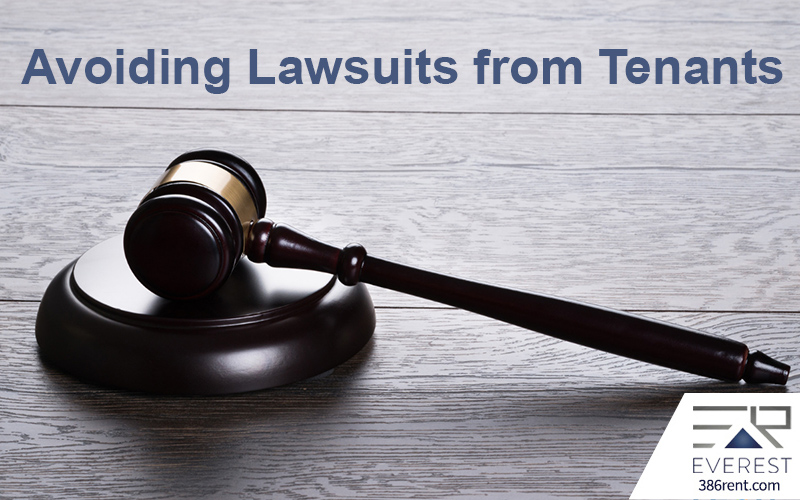World’s toughest job is being a landlord. The property management needs to be strict and professional to deal with all kind of tenants. Apart from the tenants, there is the matter of federal, state, as well as municipal laws that keep the landlords up all night.
One such problem is the lawsuits that are pretty common when it comes to residential real estate. Know the most common lawsuits and the best possible ways to avoid them, read ahead to save yourself from future mishaps.
Health as well as Safety Standards:
Tenants have legal grounds to sue the landlord if the property is uninhabitable. Some of the examples are lead paint, rodents or mold, weak structure and leaking pipes. Owners should keep a lookout and clear the issues in a timely fashion if they don’t, they can be subjected to lawsuits by the tenants.
How to Tackle?
Pre-move inspections are the best solution to this issue. Every time you are getting a new tenant, make sure that you have inspected the house thoroughly. As tenants, they should report any structural damage as well as any gas or water leak. A professional communication channel is a must between the tenant and the landlords to avoid any miscommunication.
Security deposit:
Renting laws differ from city to city and state to state, which is the reason why landlord and tenants should always check them out before signing any lease agreement. More than the tenant, the landlord should be aware of these laws. These laws have clauses about security deposits; this is why the landlord should always make sure that the tenant knows about these clauses and how to recover the deposit.
Normal wear and tear isn’t the responsibility of the tenant, whereas the accelerated wear and tear can be repaired using the deposit money. If ever a landlord deducts the deposit money on false claims, he or she can be sued by the tenant.
How to Tackle this?
Getting the inspection done using a third party is the best option here, as that will give an unbiased certificate of inspection to the landlord, and he can escape the lawsuit altogether. Always make sure that you and the tenant are on the same page regarding the pictures and the condition of the house.
Illegal clauses in a Rental Contract:
Refrain from adding any illegal term that might backfire on you as a landlord. A landlord has a huge benefit in designing the rental agreement, and the landlord should always be cautious about drawing up the contract. Pets can be prohibited, but service dogs are an exception. Also, the notice of vacancy is defined by the law, so the landlord can’t add his or her clause to this.
How to Tackle?
Keep all the state and federal laws in mind while drawing up the rental agreement. Secondly, it’s better to appoint a lawyer to take care of such matters. A lease agreement is a huge responsibility, and one can’t take that lightly.
Privacy:
Many times the landlord is required to inspect the rental property, and it’s their due right, but the landlord should never forget that privacy is a huge matter. The landlord can never enter the house without the consent of the tenant. Jurisdiction laws have defined the state of emergencies in which the landlord can enter the house without the permission of the tenant; otherwise, it would be a wring step to enter the house without the consent of the tenant.
How to Tackle?
Understand the laws of your city and state to avoid any conflict.
Discrimination
No landlord can deny the listing to any tenant on the grounds of discrimination. No landlord can say no to the tenant based on race, color, origin, religion or disability. This is prohibited by federal law. The penalties of discrimination are pretty severe.
How to handle?
Keep a legal expert in the loop before denying any tenant. Also, understand the laws and rules of fair houses council in your area. This will help you take the right step.
If you’d like to talk more about property management, or you need help with Everest Property Management, please contact us at Everest Realty.
Property Management Service Areas
Palm Coast Property Management
Flagler Beach Property Management
Ormond Beach Property Management



 As a top producing Realtor and Property Manager; Terry specializes in sales, extensive construction homes, rentals, REO’s, short sales, and all aspects of Real Estate. After graduating the University of Michigan with a master in MBA, Terry continued his endeavor and now has over 15+ years of experience in the Real Estate world. If there is anything that has to do with Real Estate and sales, you can always be sure of Terry to provide important, specialized knowledge.
As a top producing Realtor and Property Manager; Terry specializes in sales, extensive construction homes, rentals, REO’s, short sales, and all aspects of Real Estate. After graduating the University of Michigan with a master in MBA, Terry continued his endeavor and now has over 15+ years of experience in the Real Estate world. If there is anything that has to do with Real Estate and sales, you can always be sure of Terry to provide important, specialized knowledge.




